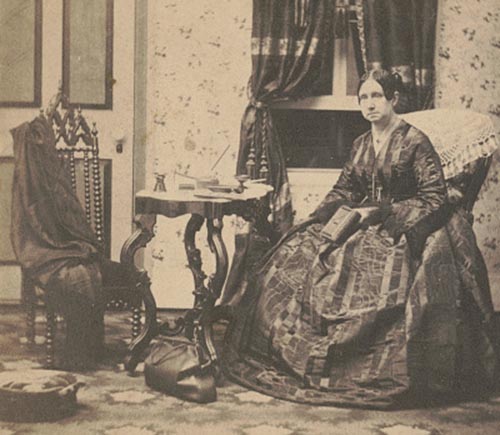April 4, 1802: Dorothea Dix, who becomes renowned nationwide as a reformer of treatment of the mentally ill and champion of their rights, is born in Hampden.

Dix teaches Sunday school lessons in the Cambridge House of Corrections in Massachusetts and witnesses the horrific conditions that people living in such places endure. From 1841 to 1843, she conducts an investigation of jails, plague houses and places where the mentally ill are confined. Then she publishes a report about them and petitions the Massachusetts Legislature for reform on behalf of patients who are confined in cages, closets, cellars, stalls and pens, sometimes chained naked and beaten with whips and rods.
From 1845 to 1852, she establishes or rebuilds psychiatric hospitals in Alabama, Maine, Maryland, Massachusetts, New Jersey, North Carolina and South Carolina.
During an extended tour of Europe in the mid-1850s, she visits facilities for the mentally ill in several countries and prompts a British government investigation of conditions in its system.
When the U.S. Civil War breaks out in 1861, President Abraham Lincoln makes Dix superintendent of war nurses. She holds that post until the end of the war, then retires to the New Jersey State Insane Hospital, where she resides until her death in 1887.
A state hospital for the mentally ill in Bangor is named in her honor.
April 4, 1854: Sagadahoc County becomes Maine’s 15th county, formed from part of Lincoln County, only 17 days after neighboring Androscoggin County is established.

Panoramic bird’s-eye view map of Richmond, in Sagadahoc County, dated 1878. Courtesy of the Library of Congress
The southern part of the Midcoast county consists chiefly of a complicated maze of peninsulas, coves, harbors and inlets on the Atlantic Ocean. In the north, the county’s centerpiece is Merrymeeting Bay, which is at the confluence of the Abagadassett, Androscoggin, Cathance, Eastern, Kennebec and Muddy rivers, as well as various brooks and streams.
The city of Bath is Sagadahoc County’s seat. At 257 square miles, the county is Maine’s smallest in area. With 35,293 residents in 2010, it is the fifth-smallest in population. Of its nine towns, one city and one unorganized territory, only the town of Bowdoin has no frontage on either the Atlantic Ocean, Merrymeeting Bay or the tidal section of the lower Kennebec River.
The county is the location of Bath Iron Works, the Swan Island Wildlife Management Area and Popham Beach and Reid state parks.
April 4, 2013: Game Warden Sgt. Terry Hughes apprehends Christopher Knight, 47, while Knight is breaking into the Pine Tree Camp in the town of Rome.
The news media dub Knight “the North Pond hermit” because of his claim to have entered the woods at the age of 20 in the North Pond area of the Belgrade Lakes and lived there almost without interruption for 27 years.
Authorities find the makeshift camp where he has been living. They conclude that while in the woods, Knight survived by stealing food and supplies during about 1,000 burglaries he committed at local summer residences and other properties.

Christopher Knight in the Kennebec County Superior Court while entering pleas for multiple burglaries and thefts while living in the woods of Rome, Maine, for 27 years. Photo by Andy Molloy/Staff Photographer
The arrest confirms rumors that circulated for decades about a pilfering hermit living in the area of North Pond, which is in Belgrade, Rome and Smithfield.
It also triggers a burst of inquiries from around the country, including a wedding proposal from the West Coast, as well as at least two bluegrass-style songs written as tributes to Knight’s exploits.
Knight pleads guilty in August to seven burglaries and six thefts in two counties. He later is sentenced to seven months in jail and payment of $2,000 of restitution, plus three years of probation.
His case becomes the subject of the 2017 nonfiction book “The Stranger in the Woods,” by Michael Finkel.
Joseph Owen is a retired copy desk chief of the Morning Sentinel and Kennebec Journal and board member of the Kennebec Historical Society. He can be contacted at: jowen@mainetoday.com.
Comments are not available on this story.
Send questions/comments to the editors.


